Analyzing Pre-Registration Education's Impact on Mental Health Nursing
VerifiedAdded on 2023/04/10
|13
|3051
|208
Essay
AI Summary
This essay delves into the impact of pre-registration education on mental health nursing, emphasizing its influence on practitioners' motivation, communication skills, and leadership abilities. It highlights how pre-registration education equips nurses with the necessary skills to address the challenges of mental health care, including effective communication with patients from diverse backgrounds and fostering leadership within the healthcare system. The essay also discusses the economic aspects of pre-registration education, including its impact on the livelihood of nursing practitioners and the potential financial burdens on students. It concludes by underscoring the importance of pre-registration education in promoting the knowledge and skills essential for a successful career in mental health nursing, ultimately contributing to the efficiency and effectiveness of mental healthcare services. The essay also touches on the shortage of qualified staff in the mental health nursing profession and stresses the importance of promoting positive theoretical and clinical learning experiences among pre-registration students.
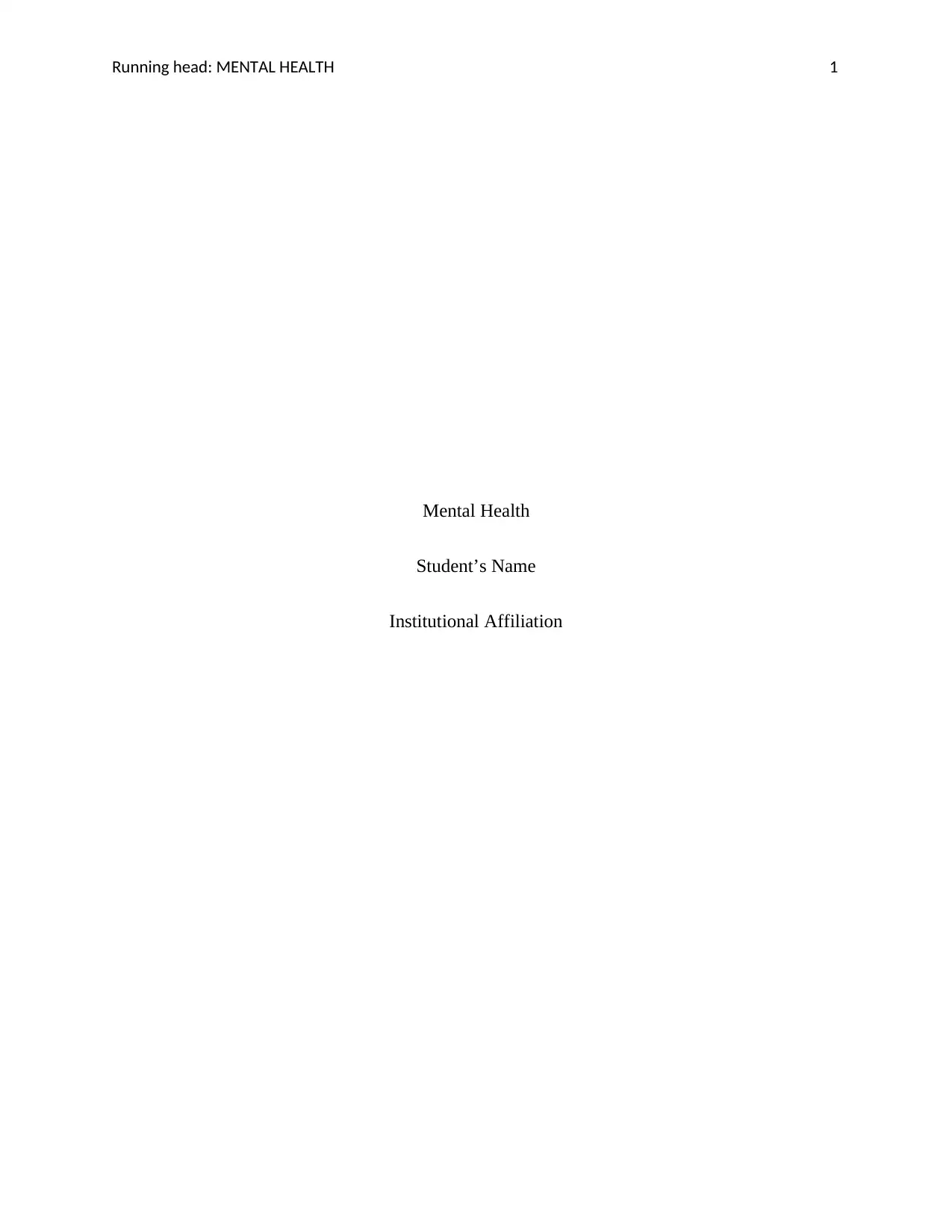
Running head: MENTAL HEALTH 1
Mental Health
Student’s Name
Institutional Affiliation
Mental Health
Student’s Name
Institutional Affiliation
Paraphrase This Document
Need a fresh take? Get an instant paraphrase of this document with our AI Paraphraser
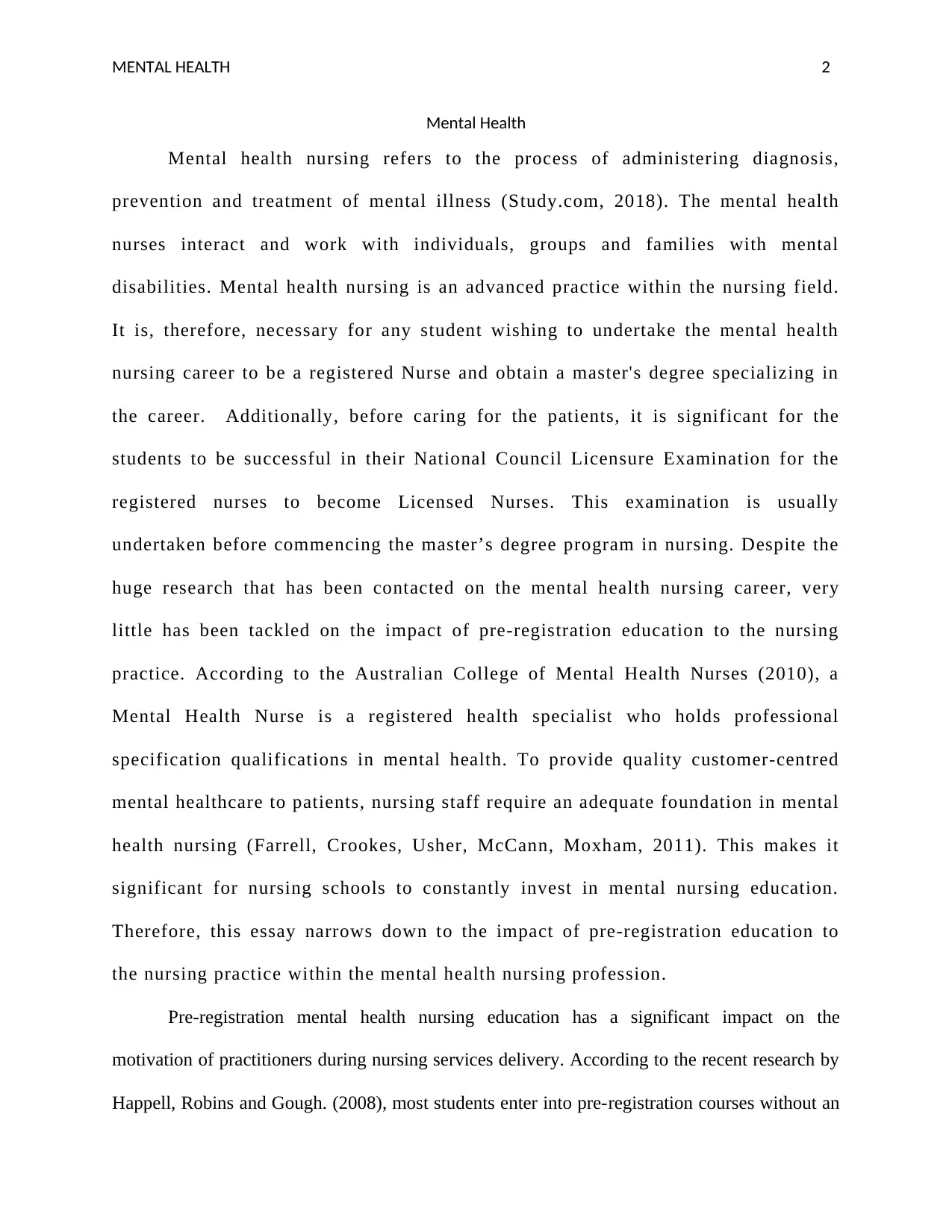
MENTAL HEALTH 2
Mental Health
Mental health nursing refers to the process of administering diagnosis,
prevention and treatment of mental illness (Study.com, 2018). The mental health
nurses interact and work with individuals, groups and families with mental
disabilities. Mental health nursing is an advanced practice within the nursing field.
It is, therefore, necessary for any student wishing to undertake the mental health
nursing career to be a registered Nurse and obtain a master's degree specializing in
the career. Additionally, before caring for the patients, it is significant for the
students to be successful in their National Council Licensure Examination for the
registered nurses to become Licensed Nurses. This examination is usually
undertaken before commencing the master’s degree program in nursing. Despite the
huge research that has been contacted on the mental health nursing career, very
little has been tackled on the impact of pre-registration education to the nursing
practice. According to the Australian College of Mental Health Nurses (2010), a
Mental Health Nurse is a registered health specialist who holds professional
specification qualifications in mental health. To provide quality customer-centred
mental healthcare to patients, nursing staff require an adequate foundation in mental
health nursing (Farrell, Crookes, Usher, McCann, Moxham, 2011). This makes it
significant for nursing schools to constantly invest in mental nursing education.
Therefore, this essay narrows down to the impact of pre-registration education to
the nursing practice within the mental health nursing profession.
Pre-registration mental health nursing education has a significant impact on the
motivation of practitioners during nursing services delivery. According to the recent research by
Happell, Robins and Gough. (2008), most students enter into pre-registration courses without an
Mental Health
Mental health nursing refers to the process of administering diagnosis,
prevention and treatment of mental illness (Study.com, 2018). The mental health
nurses interact and work with individuals, groups and families with mental
disabilities. Mental health nursing is an advanced practice within the nursing field.
It is, therefore, necessary for any student wishing to undertake the mental health
nursing career to be a registered Nurse and obtain a master's degree specializing in
the career. Additionally, before caring for the patients, it is significant for the
students to be successful in their National Council Licensure Examination for the
registered nurses to become Licensed Nurses. This examination is usually
undertaken before commencing the master’s degree program in nursing. Despite the
huge research that has been contacted on the mental health nursing career, very
little has been tackled on the impact of pre-registration education to the nursing
practice. According to the Australian College of Mental Health Nurses (2010), a
Mental Health Nurse is a registered health specialist who holds professional
specification qualifications in mental health. To provide quality customer-centred
mental healthcare to patients, nursing staff require an adequate foundation in mental
health nursing (Farrell, Crookes, Usher, McCann, Moxham, 2011). This makes it
significant for nursing schools to constantly invest in mental nursing education.
Therefore, this essay narrows down to the impact of pre-registration education to
the nursing practice within the mental health nursing profession.
Pre-registration mental health nursing education has a significant impact on the
motivation of practitioners during nursing services delivery. According to the recent research by
Happell, Robins and Gough. (2008), most students enter into pre-registration courses without an
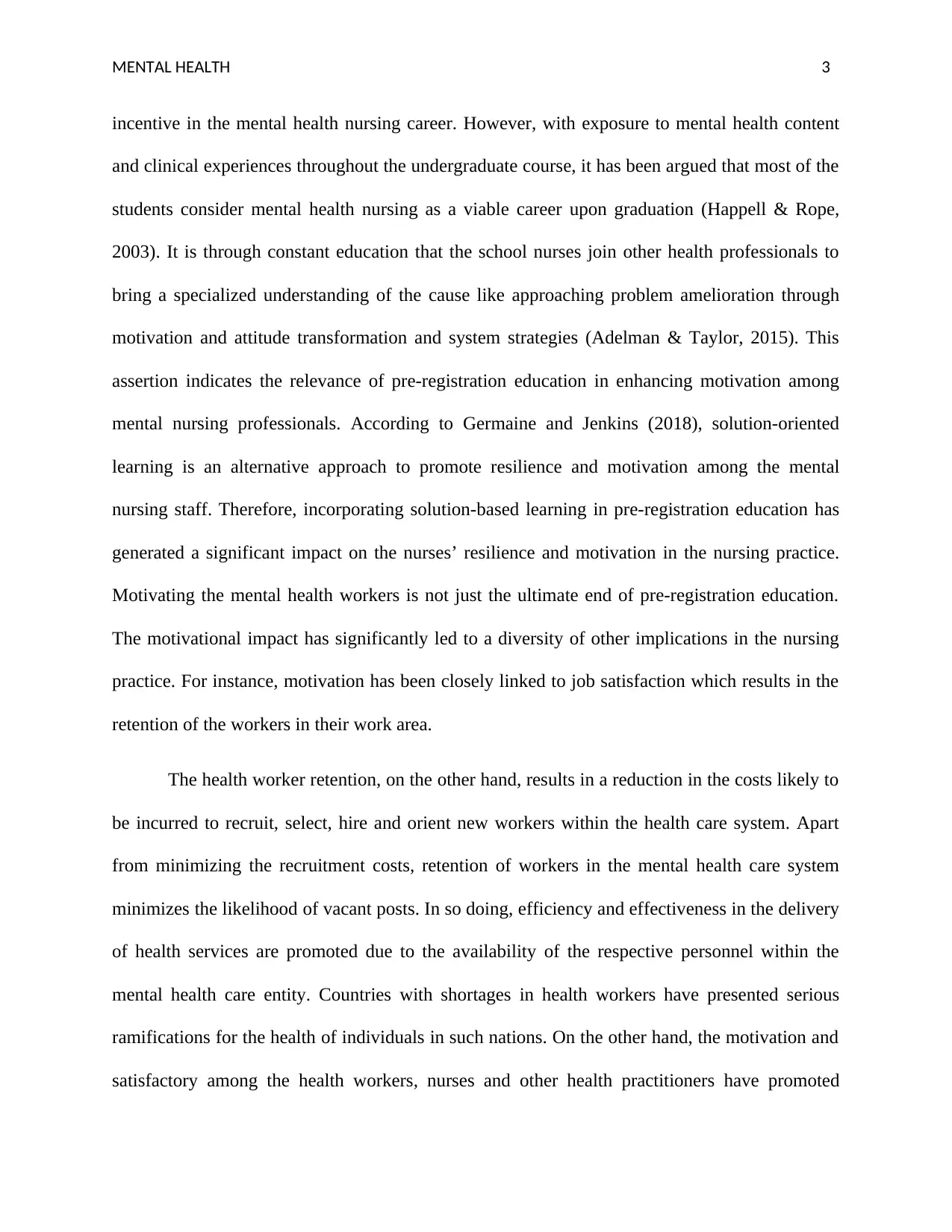
MENTAL HEALTH 3
incentive in the mental health nursing career. However, with exposure to mental health content
and clinical experiences throughout the undergraduate course, it has been argued that most of the
students consider mental health nursing as a viable career upon graduation (Happell & Rope,
2003). It is through constant education that the school nurses join other health professionals to
bring a specialized understanding of the cause like approaching problem amelioration through
motivation and attitude transformation and system strategies (Adelman & Taylor, 2015). This
assertion indicates the relevance of pre-registration education in enhancing motivation among
mental nursing professionals. According to Germaine and Jenkins (2018), solution-oriented
learning is an alternative approach to promote resilience and motivation among the mental
nursing staff. Therefore, incorporating solution-based learning in pre-registration education has
generated a significant impact on the nurses’ resilience and motivation in the nursing practice.
Motivating the mental health workers is not just the ultimate end of pre-registration education.
The motivational impact has significantly led to a diversity of other implications in the nursing
practice. For instance, motivation has been closely linked to job satisfaction which results in the
retention of the workers in their work area.
The health worker retention, on the other hand, results in a reduction in the costs likely to
be incurred to recruit, select, hire and orient new workers within the health care system. Apart
from minimizing the recruitment costs, retention of workers in the mental health care system
minimizes the likelihood of vacant posts. In so doing, efficiency and effectiveness in the delivery
of health services are promoted due to the availability of the respective personnel within the
mental health care entity. Countries with shortages in health workers have presented serious
ramifications for the health of individuals in such nations. On the other hand, the motivation and
satisfactory among the health workers, nurses and other health practitioners have promoted
incentive in the mental health nursing career. However, with exposure to mental health content
and clinical experiences throughout the undergraduate course, it has been argued that most of the
students consider mental health nursing as a viable career upon graduation (Happell & Rope,
2003). It is through constant education that the school nurses join other health professionals to
bring a specialized understanding of the cause like approaching problem amelioration through
motivation and attitude transformation and system strategies (Adelman & Taylor, 2015). This
assertion indicates the relevance of pre-registration education in enhancing motivation among
mental nursing professionals. According to Germaine and Jenkins (2018), solution-oriented
learning is an alternative approach to promote resilience and motivation among the mental
nursing staff. Therefore, incorporating solution-based learning in pre-registration education has
generated a significant impact on the nurses’ resilience and motivation in the nursing practice.
Motivating the mental health workers is not just the ultimate end of pre-registration education.
The motivational impact has significantly led to a diversity of other implications in the nursing
practice. For instance, motivation has been closely linked to job satisfaction which results in the
retention of the workers in their work area.
The health worker retention, on the other hand, results in a reduction in the costs likely to
be incurred to recruit, select, hire and orient new workers within the health care system. Apart
from minimizing the recruitment costs, retention of workers in the mental health care system
minimizes the likelihood of vacant posts. In so doing, efficiency and effectiveness in the delivery
of health services are promoted due to the availability of the respective personnel within the
mental health care entity. Countries with shortages in health workers have presented serious
ramifications for the health of individuals in such nations. On the other hand, the motivation and
satisfactory among the health workers, nurses and other health practitioners have promoted
⊘ This is a preview!⊘
Do you want full access?
Subscribe today to unlock all pages.

Trusted by 1+ million students worldwide
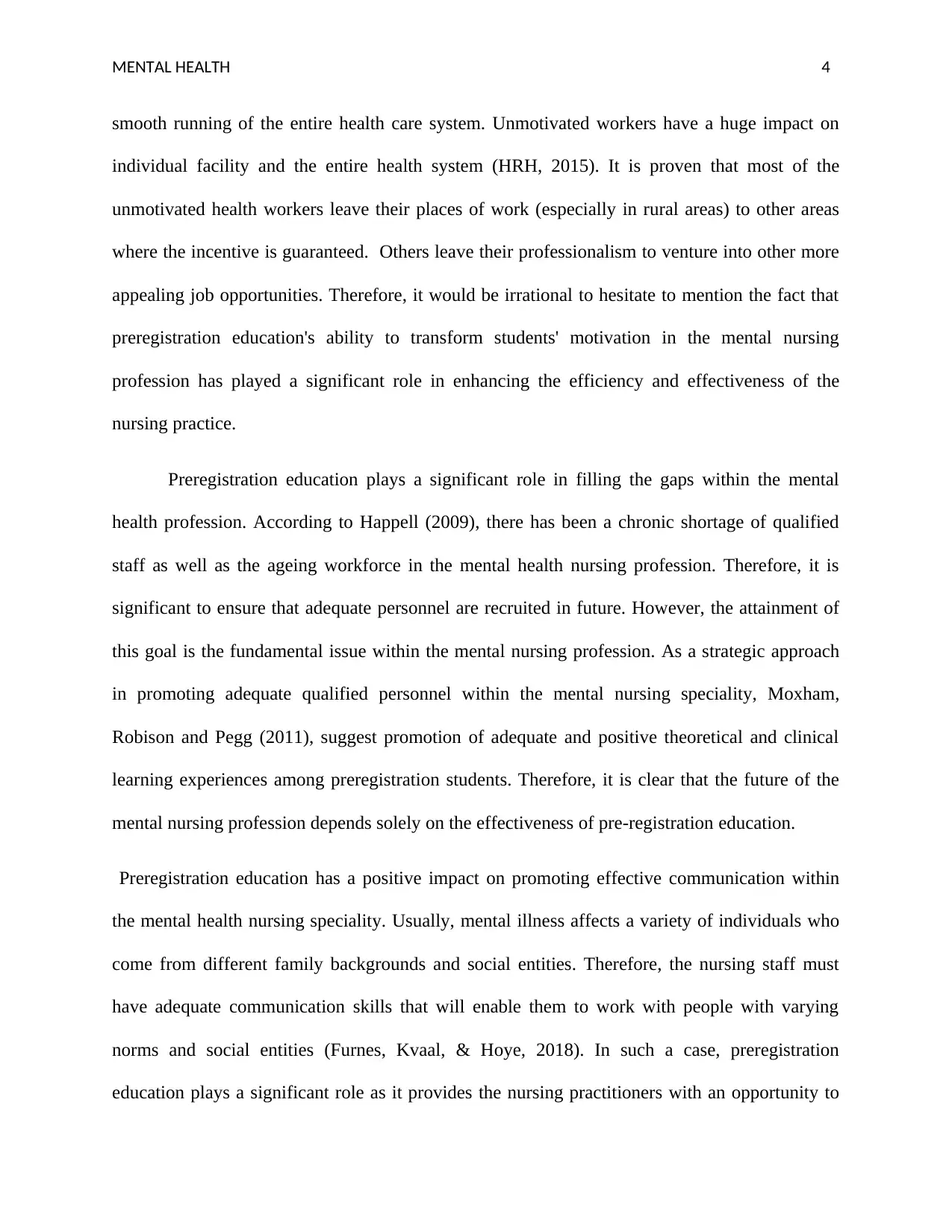
MENTAL HEALTH 4
smooth running of the entire health care system. Unmotivated workers have a huge impact on
individual facility and the entire health system (HRH, 2015). It is proven that most of the
unmotivated health workers leave their places of work (especially in rural areas) to other areas
where the incentive is guaranteed. Others leave their professionalism to venture into other more
appealing job opportunities. Therefore, it would be irrational to hesitate to mention the fact that
preregistration education's ability to transform students' motivation in the mental nursing
profession has played a significant role in enhancing the efficiency and effectiveness of the
nursing practice.
Preregistration education plays a significant role in filling the gaps within the mental
health profession. According to Happell (2009), there has been a chronic shortage of qualified
staff as well as the ageing workforce in the mental health nursing profession. Therefore, it is
significant to ensure that adequate personnel are recruited in future. However, the attainment of
this goal is the fundamental issue within the mental nursing profession. As a strategic approach
in promoting adequate qualified personnel within the mental nursing speciality, Moxham,
Robison and Pegg (2011), suggest promotion of adequate and positive theoretical and clinical
learning experiences among preregistration students. Therefore, it is clear that the future of the
mental nursing profession depends solely on the effectiveness of pre-registration education.
Preregistration education has a positive impact on promoting effective communication within
the mental health nursing speciality. Usually, mental illness affects a variety of individuals who
come from different family backgrounds and social entities. Therefore, the nursing staff must
have adequate communication skills that will enable them to work with people with varying
norms and social entities (Furnes, Kvaal, & Hoye, 2018). In such a case, preregistration
education plays a significant role as it provides the nursing practitioners with an opportunity to
smooth running of the entire health care system. Unmotivated workers have a huge impact on
individual facility and the entire health system (HRH, 2015). It is proven that most of the
unmotivated health workers leave their places of work (especially in rural areas) to other areas
where the incentive is guaranteed. Others leave their professionalism to venture into other more
appealing job opportunities. Therefore, it would be irrational to hesitate to mention the fact that
preregistration education's ability to transform students' motivation in the mental nursing
profession has played a significant role in enhancing the efficiency and effectiveness of the
nursing practice.
Preregistration education plays a significant role in filling the gaps within the mental
health profession. According to Happell (2009), there has been a chronic shortage of qualified
staff as well as the ageing workforce in the mental health nursing profession. Therefore, it is
significant to ensure that adequate personnel are recruited in future. However, the attainment of
this goal is the fundamental issue within the mental nursing profession. As a strategic approach
in promoting adequate qualified personnel within the mental nursing speciality, Moxham,
Robison and Pegg (2011), suggest promotion of adequate and positive theoretical and clinical
learning experiences among preregistration students. Therefore, it is clear that the future of the
mental nursing profession depends solely on the effectiveness of pre-registration education.
Preregistration education has a positive impact on promoting effective communication within
the mental health nursing speciality. Usually, mental illness affects a variety of individuals who
come from different family backgrounds and social entities. Therefore, the nursing staff must
have adequate communication skills that will enable them to work with people with varying
norms and social entities (Furnes, Kvaal, & Hoye, 2018). In such a case, preregistration
education plays a significant role as it provides the nursing practitioners with an opportunity to
Paraphrase This Document
Need a fresh take? Get an instant paraphrase of this document with our AI Paraphraser
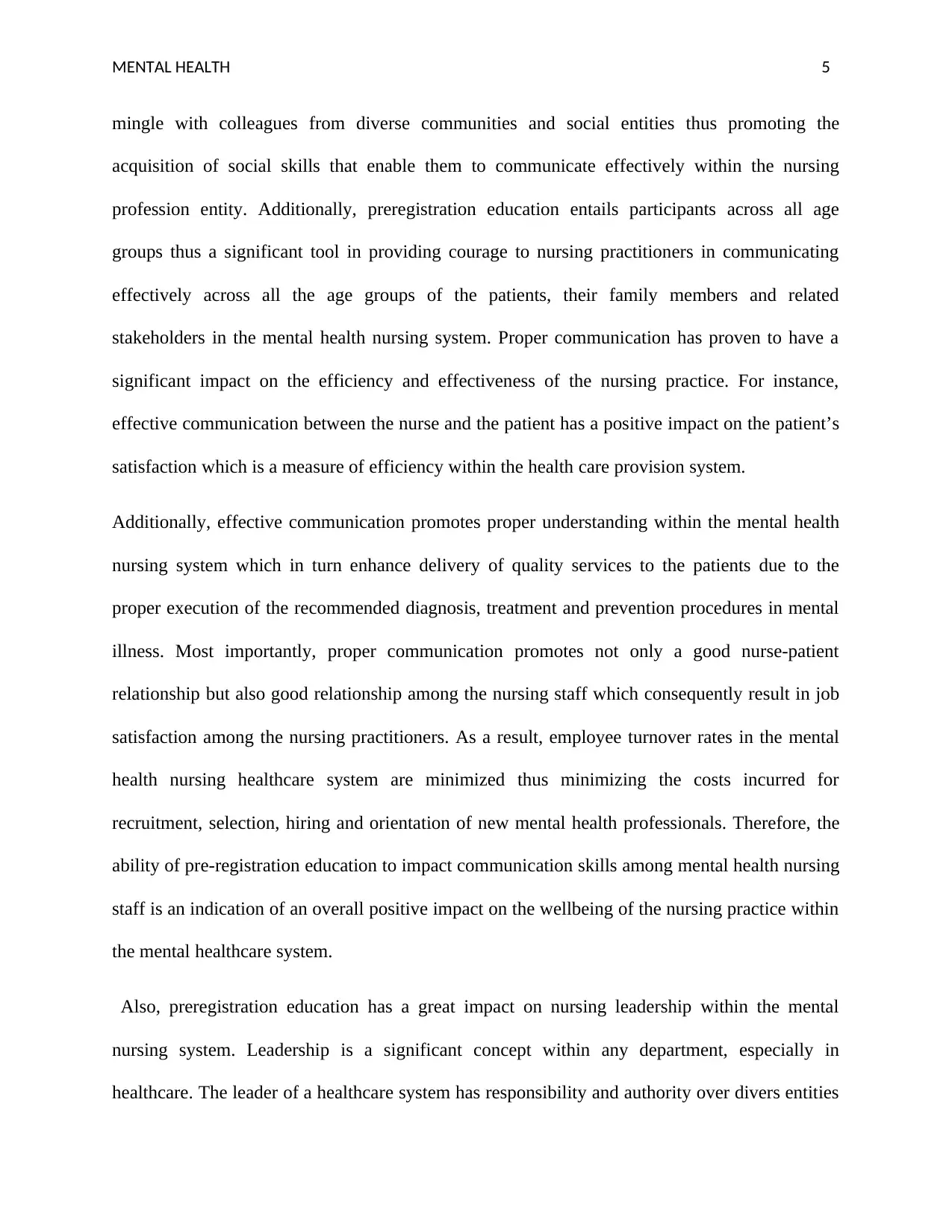
MENTAL HEALTH 5
mingle with colleagues from diverse communities and social entities thus promoting the
acquisition of social skills that enable them to communicate effectively within the nursing
profession entity. Additionally, preregistration education entails participants across all age
groups thus a significant tool in providing courage to nursing practitioners in communicating
effectively across all the age groups of the patients, their family members and related
stakeholders in the mental health nursing system. Proper communication has proven to have a
significant impact on the efficiency and effectiveness of the nursing practice. For instance,
effective communication between the nurse and the patient has a positive impact on the patient’s
satisfaction which is a measure of efficiency within the health care provision system.
Additionally, effective communication promotes proper understanding within the mental health
nursing system which in turn enhance delivery of quality services to the patients due to the
proper execution of the recommended diagnosis, treatment and prevention procedures in mental
illness. Most importantly, proper communication promotes not only a good nurse-patient
relationship but also good relationship among the nursing staff which consequently result in job
satisfaction among the nursing practitioners. As a result, employee turnover rates in the mental
health nursing healthcare system are minimized thus minimizing the costs incurred for
recruitment, selection, hiring and orientation of new mental health professionals. Therefore, the
ability of pre-registration education to impact communication skills among mental health nursing
staff is an indication of an overall positive impact on the wellbeing of the nursing practice within
the mental healthcare system.
Also, preregistration education has a great impact on nursing leadership within the mental
nursing system. Leadership is a significant concept within any department, especially in
healthcare. The leader of a healthcare system has responsibility and authority over divers entities
mingle with colleagues from diverse communities and social entities thus promoting the
acquisition of social skills that enable them to communicate effectively within the nursing
profession entity. Additionally, preregistration education entails participants across all age
groups thus a significant tool in providing courage to nursing practitioners in communicating
effectively across all the age groups of the patients, their family members and related
stakeholders in the mental health nursing system. Proper communication has proven to have a
significant impact on the efficiency and effectiveness of the nursing practice. For instance,
effective communication between the nurse and the patient has a positive impact on the patient’s
satisfaction which is a measure of efficiency within the health care provision system.
Additionally, effective communication promotes proper understanding within the mental health
nursing system which in turn enhance delivery of quality services to the patients due to the
proper execution of the recommended diagnosis, treatment and prevention procedures in mental
illness. Most importantly, proper communication promotes not only a good nurse-patient
relationship but also good relationship among the nursing staff which consequently result in job
satisfaction among the nursing practitioners. As a result, employee turnover rates in the mental
health nursing healthcare system are minimized thus minimizing the costs incurred for
recruitment, selection, hiring and orientation of new mental health professionals. Therefore, the
ability of pre-registration education to impact communication skills among mental health nursing
staff is an indication of an overall positive impact on the wellbeing of the nursing practice within
the mental healthcare system.
Also, preregistration education has a great impact on nursing leadership within the mental
nursing system. Leadership is a significant concept within any department, especially in
healthcare. The leader of a healthcare system has responsibility and authority over divers entities
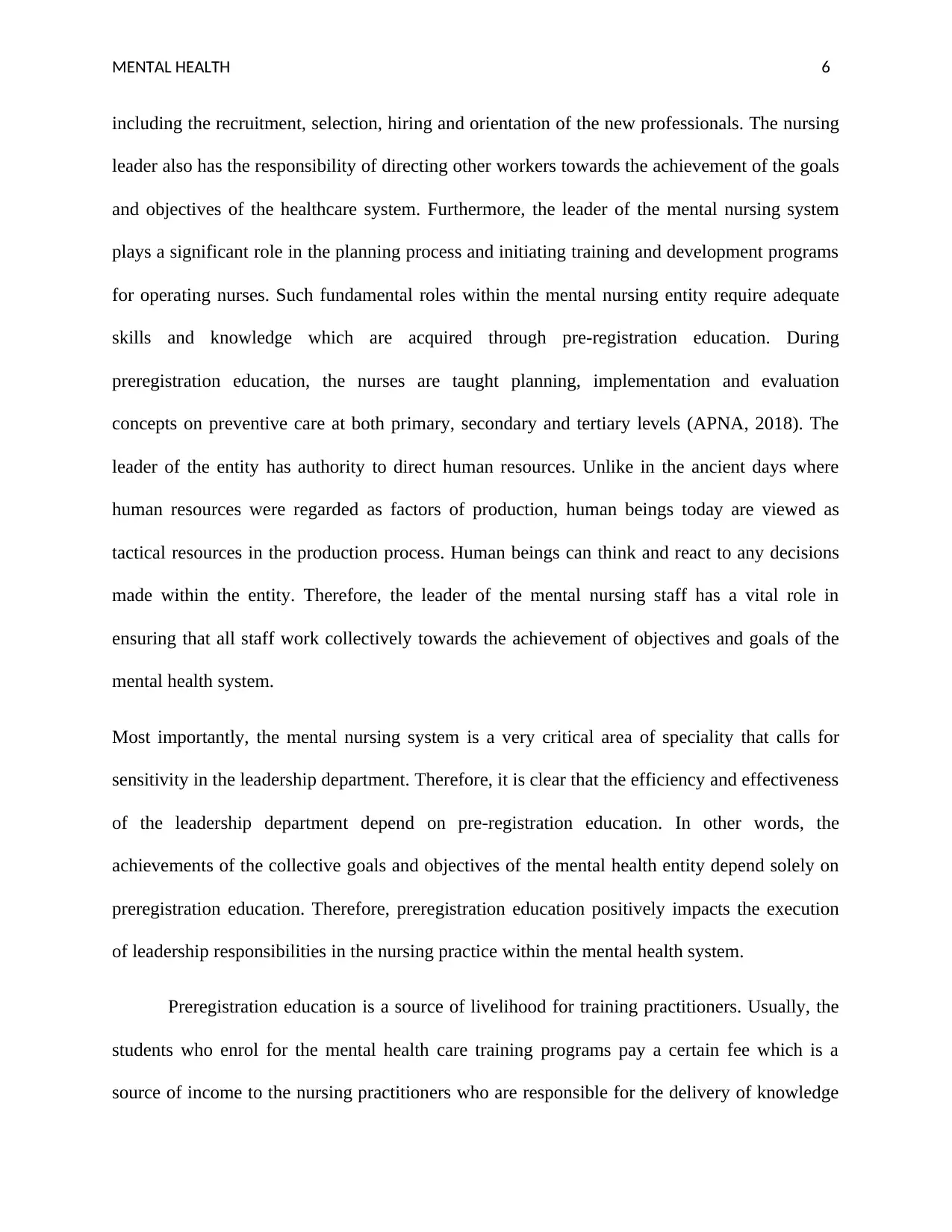
MENTAL HEALTH 6
including the recruitment, selection, hiring and orientation of the new professionals. The nursing
leader also has the responsibility of directing other workers towards the achievement of the goals
and objectives of the healthcare system. Furthermore, the leader of the mental nursing system
plays a significant role in the planning process and initiating training and development programs
for operating nurses. Such fundamental roles within the mental nursing entity require adequate
skills and knowledge which are acquired through pre-registration education. During
preregistration education, the nurses are taught planning, implementation and evaluation
concepts on preventive care at both primary, secondary and tertiary levels (APNA, 2018). The
leader of the entity has authority to direct human resources. Unlike in the ancient days where
human resources were regarded as factors of production, human beings today are viewed as
tactical resources in the production process. Human beings can think and react to any decisions
made within the entity. Therefore, the leader of the mental nursing staff has a vital role in
ensuring that all staff work collectively towards the achievement of objectives and goals of the
mental health system.
Most importantly, the mental nursing system is a very critical area of speciality that calls for
sensitivity in the leadership department. Therefore, it is clear that the efficiency and effectiveness
of the leadership department depend on pre-registration education. In other words, the
achievements of the collective goals and objectives of the mental health entity depend solely on
preregistration education. Therefore, preregistration education positively impacts the execution
of leadership responsibilities in the nursing practice within the mental health system.
Preregistration education is a source of livelihood for training practitioners. Usually, the
students who enrol for the mental health care training programs pay a certain fee which is a
source of income to the nursing practitioners who are responsible for the delivery of knowledge
including the recruitment, selection, hiring and orientation of the new professionals. The nursing
leader also has the responsibility of directing other workers towards the achievement of the goals
and objectives of the healthcare system. Furthermore, the leader of the mental nursing system
plays a significant role in the planning process and initiating training and development programs
for operating nurses. Such fundamental roles within the mental nursing entity require adequate
skills and knowledge which are acquired through pre-registration education. During
preregistration education, the nurses are taught planning, implementation and evaluation
concepts on preventive care at both primary, secondary and tertiary levels (APNA, 2018). The
leader of the entity has authority to direct human resources. Unlike in the ancient days where
human resources were regarded as factors of production, human beings today are viewed as
tactical resources in the production process. Human beings can think and react to any decisions
made within the entity. Therefore, the leader of the mental nursing staff has a vital role in
ensuring that all staff work collectively towards the achievement of objectives and goals of the
mental health system.
Most importantly, the mental nursing system is a very critical area of speciality that calls for
sensitivity in the leadership department. Therefore, it is clear that the efficiency and effectiveness
of the leadership department depend on pre-registration education. In other words, the
achievements of the collective goals and objectives of the mental health entity depend solely on
preregistration education. Therefore, preregistration education positively impacts the execution
of leadership responsibilities in the nursing practice within the mental health system.
Preregistration education is a source of livelihood for training practitioners. Usually, the
students who enrol for the mental health care training programs pay a certain fee which is a
source of income to the nursing practitioners who are responsible for the delivery of knowledge
⊘ This is a preview!⊘
Do you want full access?
Subscribe today to unlock all pages.

Trusted by 1+ million students worldwide
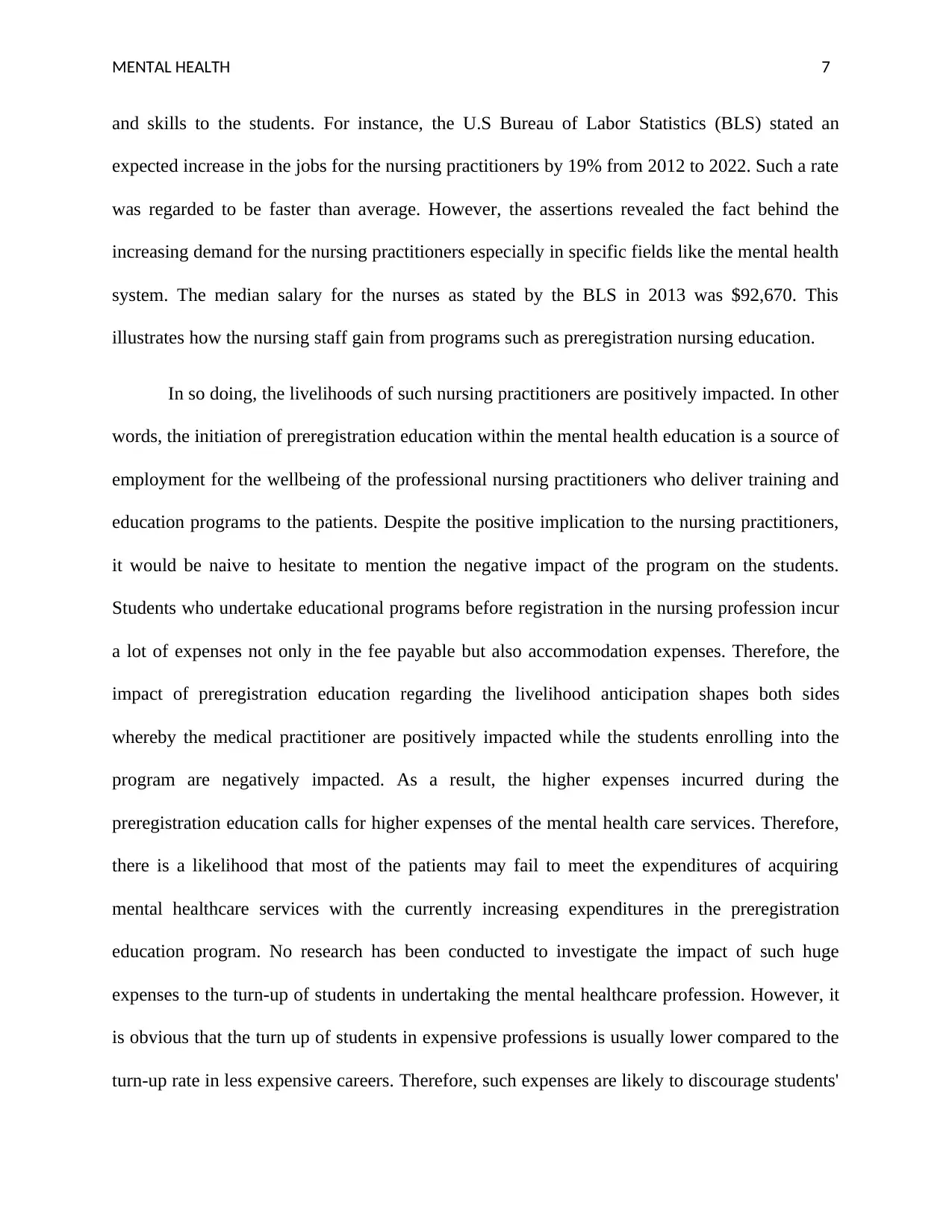
MENTAL HEALTH 7
and skills to the students. For instance, the U.S Bureau of Labor Statistics (BLS) stated an
expected increase in the jobs for the nursing practitioners by 19% from 2012 to 2022. Such a rate
was regarded to be faster than average. However, the assertions revealed the fact behind the
increasing demand for the nursing practitioners especially in specific fields like the mental health
system. The median salary for the nurses as stated by the BLS in 2013 was $92,670. This
illustrates how the nursing staff gain from programs such as preregistration nursing education.
In so doing, the livelihoods of such nursing practitioners are positively impacted. In other
words, the initiation of preregistration education within the mental health education is a source of
employment for the wellbeing of the professional nursing practitioners who deliver training and
education programs to the patients. Despite the positive implication to the nursing practitioners,
it would be naive to hesitate to mention the negative impact of the program on the students.
Students who undertake educational programs before registration in the nursing profession incur
a lot of expenses not only in the fee payable but also accommodation expenses. Therefore, the
impact of preregistration education regarding the livelihood anticipation shapes both sides
whereby the medical practitioner are positively impacted while the students enrolling into the
program are negatively impacted. As a result, the higher expenses incurred during the
preregistration education calls for higher expenses of the mental health care services. Therefore,
there is a likelihood that most of the patients may fail to meet the expenditures of acquiring
mental healthcare services with the currently increasing expenditures in the preregistration
education program. No research has been conducted to investigate the impact of such huge
expenses to the turn-up of students in undertaking the mental healthcare profession. However, it
is obvious that the turn up of students in expensive professions is usually lower compared to the
turn-up rate in less expensive careers. Therefore, such expenses are likely to discourage students'
and skills to the students. For instance, the U.S Bureau of Labor Statistics (BLS) stated an
expected increase in the jobs for the nursing practitioners by 19% from 2012 to 2022. Such a rate
was regarded to be faster than average. However, the assertions revealed the fact behind the
increasing demand for the nursing practitioners especially in specific fields like the mental health
system. The median salary for the nurses as stated by the BLS in 2013 was $92,670. This
illustrates how the nursing staff gain from programs such as preregistration nursing education.
In so doing, the livelihoods of such nursing practitioners are positively impacted. In other
words, the initiation of preregistration education within the mental health education is a source of
employment for the wellbeing of the professional nursing practitioners who deliver training and
education programs to the patients. Despite the positive implication to the nursing practitioners,
it would be naive to hesitate to mention the negative impact of the program on the students.
Students who undertake educational programs before registration in the nursing profession incur
a lot of expenses not only in the fee payable but also accommodation expenses. Therefore, the
impact of preregistration education regarding the livelihood anticipation shapes both sides
whereby the medical practitioner are positively impacted while the students enrolling into the
program are negatively impacted. As a result, the higher expenses incurred during the
preregistration education calls for higher expenses of the mental health care services. Therefore,
there is a likelihood that most of the patients may fail to meet the expenditures of acquiring
mental healthcare services with the currently increasing expenditures in the preregistration
education program. No research has been conducted to investigate the impact of such huge
expenses to the turn-up of students in undertaking the mental healthcare profession. However, it
is obvious that the turn up of students in expensive professions is usually lower compared to the
turn-up rate in less expensive careers. Therefore, such expenses are likely to discourage students'
Paraphrase This Document
Need a fresh take? Get an instant paraphrase of this document with our AI Paraphraser
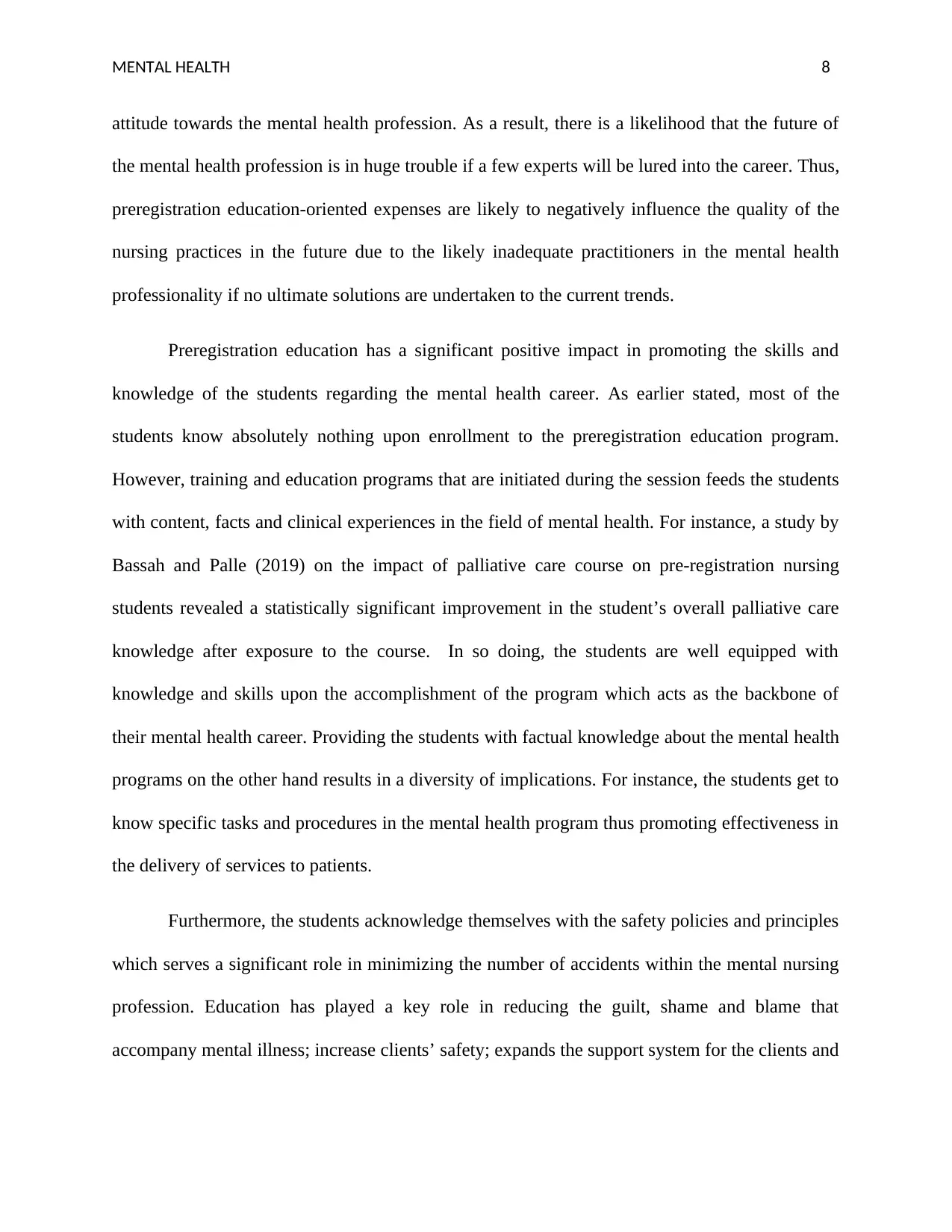
MENTAL HEALTH 8
attitude towards the mental health profession. As a result, there is a likelihood that the future of
the mental health profession is in huge trouble if a few experts will be lured into the career. Thus,
preregistration education-oriented expenses are likely to negatively influence the quality of the
nursing practices in the future due to the likely inadequate practitioners in the mental health
professionality if no ultimate solutions are undertaken to the current trends.
Preregistration education has a significant positive impact in promoting the skills and
knowledge of the students regarding the mental health career. As earlier stated, most of the
students know absolutely nothing upon enrollment to the preregistration education program.
However, training and education programs that are initiated during the session feeds the students
with content, facts and clinical experiences in the field of mental health. For instance, a study by
Bassah and Palle (2019) on the impact of palliative care course on pre-registration nursing
students revealed a statistically significant improvement in the student’s overall palliative care
knowledge after exposure to the course. In so doing, the students are well equipped with
knowledge and skills upon the accomplishment of the program which acts as the backbone of
their mental health career. Providing the students with factual knowledge about the mental health
programs on the other hand results in a diversity of implications. For instance, the students get to
know specific tasks and procedures in the mental health program thus promoting effectiveness in
the delivery of services to patients.
Furthermore, the students acknowledge themselves with the safety policies and principles
which serves a significant role in minimizing the number of accidents within the mental nursing
profession. Education has played a key role in reducing the guilt, shame and blame that
accompany mental illness; increase clients’ safety; expands the support system for the clients and
attitude towards the mental health profession. As a result, there is a likelihood that the future of
the mental health profession is in huge trouble if a few experts will be lured into the career. Thus,
preregistration education-oriented expenses are likely to negatively influence the quality of the
nursing practices in the future due to the likely inadequate practitioners in the mental health
professionality if no ultimate solutions are undertaken to the current trends.
Preregistration education has a significant positive impact in promoting the skills and
knowledge of the students regarding the mental health career. As earlier stated, most of the
students know absolutely nothing upon enrollment to the preregistration education program.
However, training and education programs that are initiated during the session feeds the students
with content, facts and clinical experiences in the field of mental health. For instance, a study by
Bassah and Palle (2019) on the impact of palliative care course on pre-registration nursing
students revealed a statistically significant improvement in the student’s overall palliative care
knowledge after exposure to the course. In so doing, the students are well equipped with
knowledge and skills upon the accomplishment of the program which acts as the backbone of
their mental health career. Providing the students with factual knowledge about the mental health
programs on the other hand results in a diversity of implications. For instance, the students get to
know specific tasks and procedures in the mental health program thus promoting effectiveness in
the delivery of services to patients.
Furthermore, the students acknowledge themselves with the safety policies and principles
which serves a significant role in minimizing the number of accidents within the mental nursing
profession. Education has played a key role in reducing the guilt, shame and blame that
accompany mental illness; increase clients’ safety; expands the support system for the clients and
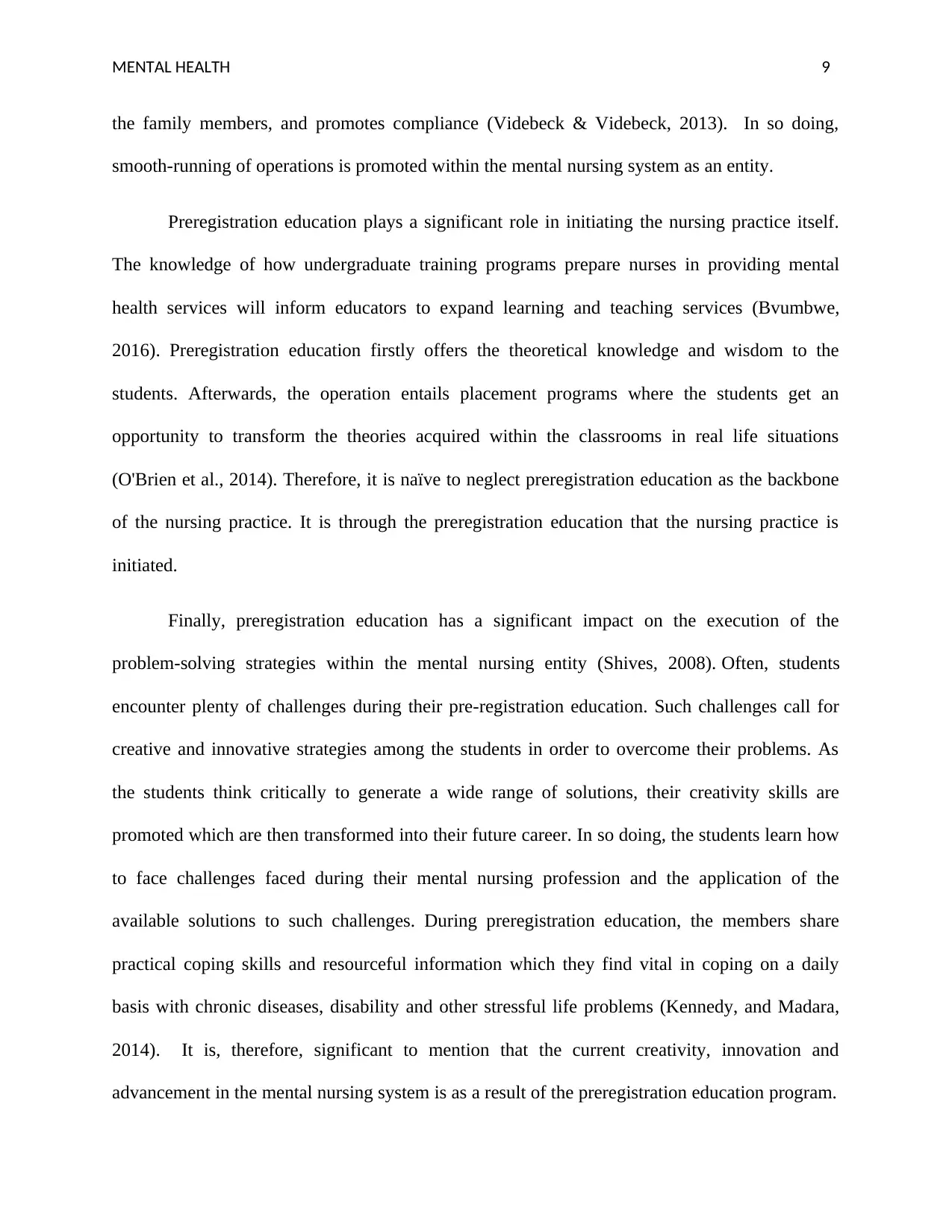
MENTAL HEALTH 9
the family members, and promotes compliance (Videbeck & Videbeck, 2013). In so doing,
smooth-running of operations is promoted within the mental nursing system as an entity.
Preregistration education plays a significant role in initiating the nursing practice itself.
The knowledge of how undergraduate training programs prepare nurses in providing mental
health services will inform educators to expand learning and teaching services (Bvumbwe,
2016). Preregistration education firstly offers the theoretical knowledge and wisdom to the
students. Afterwards, the operation entails placement programs where the students get an
opportunity to transform the theories acquired within the classrooms in real life situations
(O'Brien et al., 2014). Therefore, it is naïve to neglect preregistration education as the backbone
of the nursing practice. It is through the preregistration education that the nursing practice is
initiated.
Finally, preregistration education has a significant impact on the execution of the
problem-solving strategies within the mental nursing entity (Shives, 2008). Often, students
encounter plenty of challenges during their pre-registration education. Such challenges call for
creative and innovative strategies among the students in order to overcome their problems. As
the students think critically to generate a wide range of solutions, their creativity skills are
promoted which are then transformed into their future career. In so doing, the students learn how
to face challenges faced during their mental nursing profession and the application of the
available solutions to such challenges. During preregistration education, the members share
practical coping skills and resourceful information which they find vital in coping on a daily
basis with chronic diseases, disability and other stressful life problems (Kennedy, and Madara,
2014). It is, therefore, significant to mention that the current creativity, innovation and
advancement in the mental nursing system is as a result of the preregistration education program.
the family members, and promotes compliance (Videbeck & Videbeck, 2013). In so doing,
smooth-running of operations is promoted within the mental nursing system as an entity.
Preregistration education plays a significant role in initiating the nursing practice itself.
The knowledge of how undergraduate training programs prepare nurses in providing mental
health services will inform educators to expand learning and teaching services (Bvumbwe,
2016). Preregistration education firstly offers the theoretical knowledge and wisdom to the
students. Afterwards, the operation entails placement programs where the students get an
opportunity to transform the theories acquired within the classrooms in real life situations
(O'Brien et al., 2014). Therefore, it is naïve to neglect preregistration education as the backbone
of the nursing practice. It is through the preregistration education that the nursing practice is
initiated.
Finally, preregistration education has a significant impact on the execution of the
problem-solving strategies within the mental nursing entity (Shives, 2008). Often, students
encounter plenty of challenges during their pre-registration education. Such challenges call for
creative and innovative strategies among the students in order to overcome their problems. As
the students think critically to generate a wide range of solutions, their creativity skills are
promoted which are then transformed into their future career. In so doing, the students learn how
to face challenges faced during their mental nursing profession and the application of the
available solutions to such challenges. During preregistration education, the members share
practical coping skills and resourceful information which they find vital in coping on a daily
basis with chronic diseases, disability and other stressful life problems (Kennedy, and Madara,
2014). It is, therefore, significant to mention that the current creativity, innovation and
advancement in the mental nursing system is as a result of the preregistration education program.
⊘ This is a preview!⊘
Do you want full access?
Subscribe today to unlock all pages.

Trusted by 1+ million students worldwide
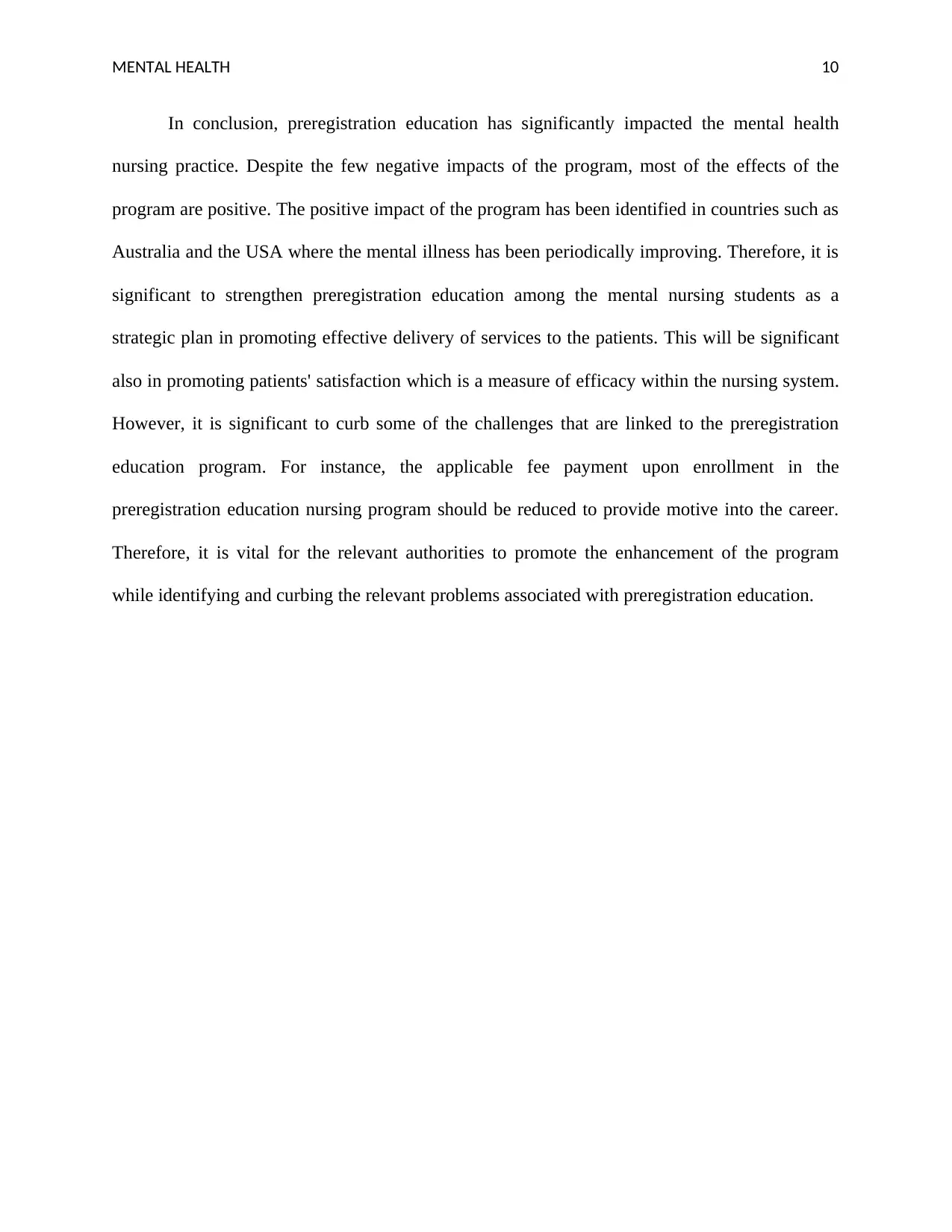
MENTAL HEALTH 10
In conclusion, preregistration education has significantly impacted the mental health
nursing practice. Despite the few negative impacts of the program, most of the effects of the
program are positive. The positive impact of the program has been identified in countries such as
Australia and the USA where the mental illness has been periodically improving. Therefore, it is
significant to strengthen preregistration education among the mental nursing students as a
strategic plan in promoting effective delivery of services to the patients. This will be significant
also in promoting patients' satisfaction which is a measure of efficacy within the nursing system.
However, it is significant to curb some of the challenges that are linked to the preregistration
education program. For instance, the applicable fee payment upon enrollment in the
preregistration education nursing program should be reduced to provide motive into the career.
Therefore, it is vital for the relevant authorities to promote the enhancement of the program
while identifying and curbing the relevant problems associated with preregistration education.
In conclusion, preregistration education has significantly impacted the mental health
nursing practice. Despite the few negative impacts of the program, most of the effects of the
program are positive. The positive impact of the program has been identified in countries such as
Australia and the USA where the mental illness has been periodically improving. Therefore, it is
significant to strengthen preregistration education among the mental nursing students as a
strategic plan in promoting effective delivery of services to the patients. This will be significant
also in promoting patients' satisfaction which is a measure of efficacy within the nursing system.
However, it is significant to curb some of the challenges that are linked to the preregistration
education program. For instance, the applicable fee payment upon enrollment in the
preregistration education nursing program should be reduced to provide motive into the career.
Therefore, it is vital for the relevant authorities to promote the enhancement of the program
while identifying and curbing the relevant problems associated with preregistration education.
Paraphrase This Document
Need a fresh take? Get an instant paraphrase of this document with our AI Paraphraser
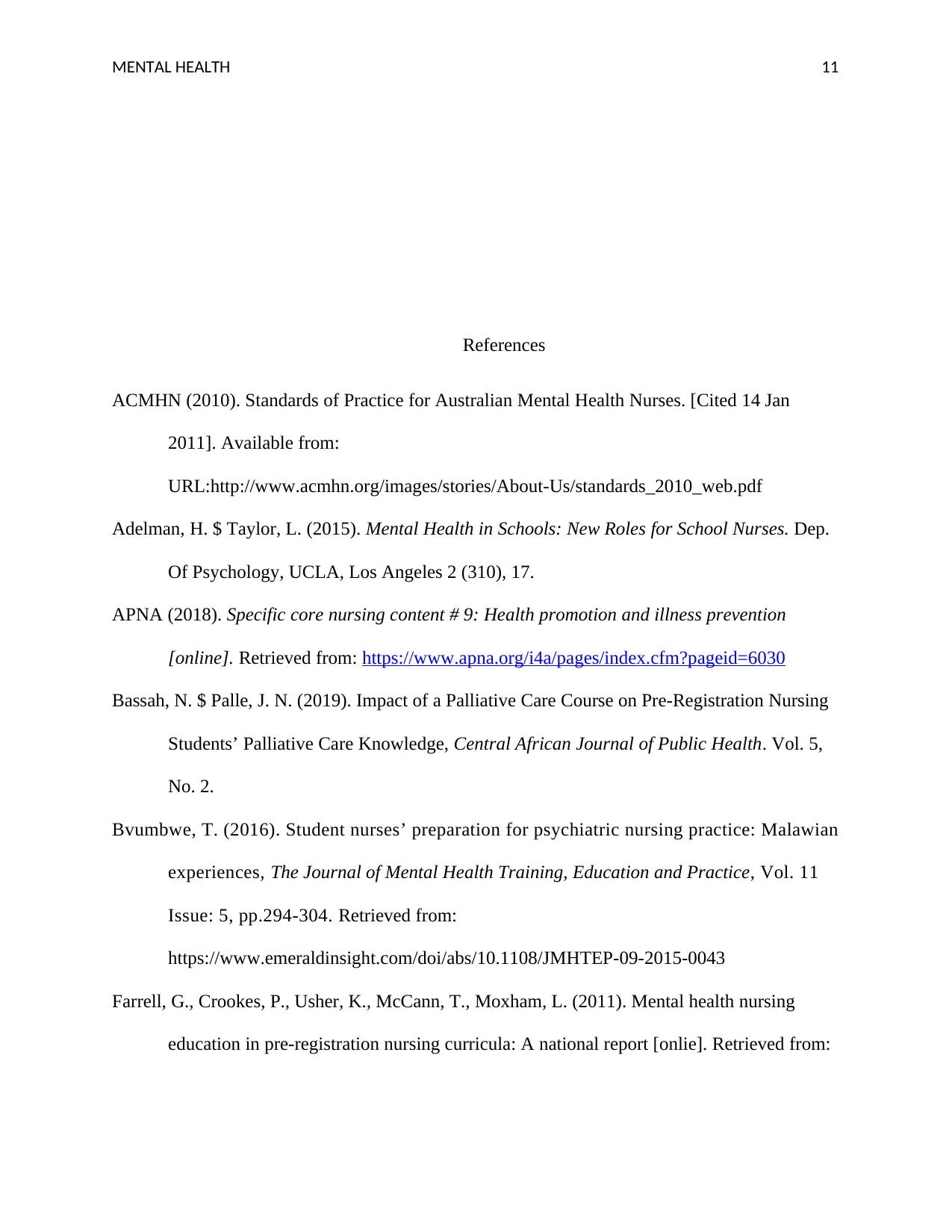
MENTAL HEALTH 11
References
ACMHN (2010). Standards of Practice for Australian Mental Health Nurses. [Cited 14 Jan
2011]. Available from:
URL:http://www.acmhn.org/images/stories/About-Us/standards_2010_web.pdf
Adelman, H. $ Taylor, L. (2015). Mental Health in Schools: New Roles for School Nurses. Dep.
Of Psychology, UCLA, Los Angeles 2 (310), 17.
APNA (2018). Specific core nursing content # 9: Health promotion and illness prevention
[online]. Retrieved from: https://www.apna.org/i4a/pages/index.cfm?pageid=6030
Bassah, N. $ Palle, J. N. (2019). Impact of a Palliative Care Course on Pre-Registration Nursing
Students’ Palliative Care Knowledge, Central African Journal of Public Health. Vol. 5,
No. 2.
Bvumbwe, T. (2016). Student nurses’ preparation for psychiatric nursing practice: Malawian
experiences, The Journal of Mental Health Training, Education and Practice, Vol. 11
Issue: 5, pp.294-304. Retrieved from:
https://www.emeraldinsight.com/doi/abs/10.1108/JMHTEP-09-2015-0043
Farrell, G., Crookes, P., Usher, K., McCann, T., Moxham, L. (2011). Mental health nursing
education in pre-registration nursing curricula: A national report [onlie]. Retrieved from:
References
ACMHN (2010). Standards of Practice for Australian Mental Health Nurses. [Cited 14 Jan
2011]. Available from:
URL:http://www.acmhn.org/images/stories/About-Us/standards_2010_web.pdf
Adelman, H. $ Taylor, L. (2015). Mental Health in Schools: New Roles for School Nurses. Dep.
Of Psychology, UCLA, Los Angeles 2 (310), 17.
APNA (2018). Specific core nursing content # 9: Health promotion and illness prevention
[online]. Retrieved from: https://www.apna.org/i4a/pages/index.cfm?pageid=6030
Bassah, N. $ Palle, J. N. (2019). Impact of a Palliative Care Course on Pre-Registration Nursing
Students’ Palliative Care Knowledge, Central African Journal of Public Health. Vol. 5,
No. 2.
Bvumbwe, T. (2016). Student nurses’ preparation for psychiatric nursing practice: Malawian
experiences, The Journal of Mental Health Training, Education and Practice, Vol. 11
Issue: 5, pp.294-304. Retrieved from:
https://www.emeraldinsight.com/doi/abs/10.1108/JMHTEP-09-2015-0043
Farrell, G., Crookes, P., Usher, K., McCann, T., Moxham, L. (2011). Mental health nursing
education in pre-registration nursing curricula: A national report [onlie]. Retrieved from:
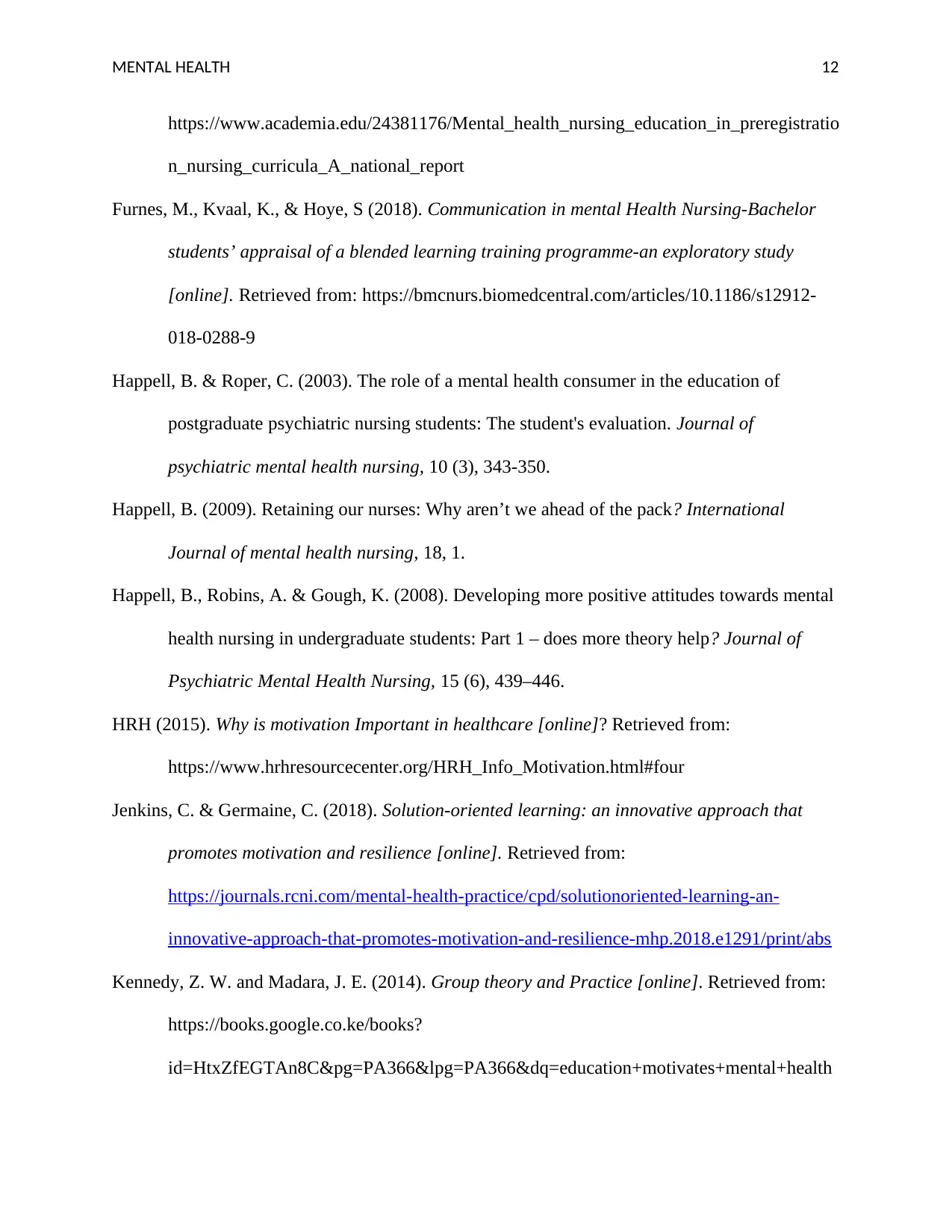
MENTAL HEALTH 12
https://www.academia.edu/24381176/Mental_health_nursing_education_in_preregistratio
n_nursing_curricula_A_national_report
Furnes, M., Kvaal, K., & Hoye, S (2018). Communication in mental Health Nursing-Bachelor
students’ appraisal of a blended learning training programme-an exploratory study
[online]. Retrieved from: https://bmcnurs.biomedcentral.com/articles/10.1186/s12912-
018-0288-9
Happell, B. & Roper, C. (2003). The role of a mental health consumer in the education of
postgraduate psychiatric nursing students: The student's evaluation. Journal of
psychiatric mental health nursing, 10 (3), 343-350.
Happell, B. (2009). Retaining our nurses: Why aren’t we ahead of the pack? International
Journal of mental health nursing, 18, 1.
Happell, B., Robins, A. & Gough, K. (2008). Developing more positive attitudes towards mental
health nursing in undergraduate students: Part 1 – does more theory help? Journal of
Psychiatric Mental Health Nursing, 15 (6), 439–446.
HRH (2015). Why is motivation Important in healthcare [online]? Retrieved from:
https://www.hrhresourcecenter.org/HRH_Info_Motivation.html#four
Jenkins, C. & Germaine, C. (2018). Solution-oriented learning: an innovative approach that
promotes motivation and resilience [online]. Retrieved from:
https://journals.rcni.com/mental-health-practice/cpd/solutionoriented-learning-an-
innovative-approach-that-promotes-motivation-and-resilience-mhp.2018.e1291/print/abs
Kennedy, Z. W. and Madara, J. E. (2014). Group theory and Practice [online]. Retrieved from:
https://books.google.co.ke/books?
id=HtxZfEGTAn8C&pg=PA366&lpg=PA366&dq=education+motivates+mental+health
https://www.academia.edu/24381176/Mental_health_nursing_education_in_preregistratio
n_nursing_curricula_A_national_report
Furnes, M., Kvaal, K., & Hoye, S (2018). Communication in mental Health Nursing-Bachelor
students’ appraisal of a blended learning training programme-an exploratory study
[online]. Retrieved from: https://bmcnurs.biomedcentral.com/articles/10.1186/s12912-
018-0288-9
Happell, B. & Roper, C. (2003). The role of a mental health consumer in the education of
postgraduate psychiatric nursing students: The student's evaluation. Journal of
psychiatric mental health nursing, 10 (3), 343-350.
Happell, B. (2009). Retaining our nurses: Why aren’t we ahead of the pack? International
Journal of mental health nursing, 18, 1.
Happell, B., Robins, A. & Gough, K. (2008). Developing more positive attitudes towards mental
health nursing in undergraduate students: Part 1 – does more theory help? Journal of
Psychiatric Mental Health Nursing, 15 (6), 439–446.
HRH (2015). Why is motivation Important in healthcare [online]? Retrieved from:
https://www.hrhresourcecenter.org/HRH_Info_Motivation.html#four
Jenkins, C. & Germaine, C. (2018). Solution-oriented learning: an innovative approach that
promotes motivation and resilience [online]. Retrieved from:
https://journals.rcni.com/mental-health-practice/cpd/solutionoriented-learning-an-
innovative-approach-that-promotes-motivation-and-resilience-mhp.2018.e1291/print/abs
Kennedy, Z. W. and Madara, J. E. (2014). Group theory and Practice [online]. Retrieved from:
https://books.google.co.ke/books?
id=HtxZfEGTAn8C&pg=PA366&lpg=PA366&dq=education+motivates+mental+health
⊘ This is a preview!⊘
Do you want full access?
Subscribe today to unlock all pages.

Trusted by 1+ million students worldwide
1 out of 13
Related Documents
Your All-in-One AI-Powered Toolkit for Academic Success.
+13062052269
info@desklib.com
Available 24*7 on WhatsApp / Email
![[object Object]](/_next/static/media/star-bottom.7253800d.svg)
Unlock your academic potential
Copyright © 2020–2026 A2Z Services. All Rights Reserved. Developed and managed by ZUCOL.




